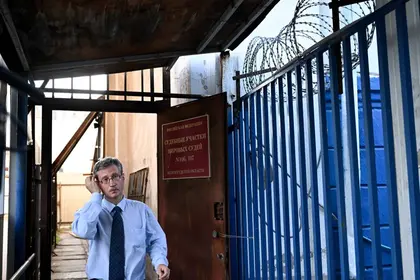In the bedroom of his modest apartment in the southern Russian city of Volgograd, ex-university lecturer Roman Melnichenko has two bags packed: one if he goes to prison, the other if he has to flee.
“I have to be ready,” the 49-year-old says.
JOIN US ON TELEGRAM
Follow our coverage of the war on the @Kyivpost_official.
Melnichenko taught law in Volgograd, known as Stalingrad in Soviet times, for 25 years before he was fired in April for speaking out against Russia’s military action in Ukraine.
He is battling in court for the right to keep teaching, while facing other legal troubles after he was charged with spreading “false” information about the conflict.
Teachers have been under increasing pressure in Russia for years as authorities cracked down on free speech, with many dismissed for alleged “immoral conduct” after they criticised the government or challenged the country’s increasing conservatism.
This has intensified since President Vladimir Putin sent troops into Ukraine in late February, and Melnichenko said he understands why.
“The intellectual elite has the power to make the ruling elite lose the foundations of its power, that’s why there is such a harsh reaction against universities,” the moustachioed former senior lecturer at Volgograd State University told AFP.
Melnichenko was fired for “immoral conduct” after sharing social media posts denouncing Moscow’s intervention in Ukraine, despite agreeing to a request from the university to delete the posts.

Zelensky Meets CIA Director William Burns in Ukraine
He was also detained by police at the university and accused of spreading “false” information — one of the many Russians who have fallen foul of new restrictions against criticising the offensive.
– ‘In shock for three months’ –
At the police station, he made the symbolic move of demanding a Ukrainian translator — a right under Russian law — but was refused.
Melnichenko may live in Russia, but he has a deep connection to Ukraine.
His parents live in Nikopol, a city in southern Ukraine close to the front line.
“I have been in shock for the past three months. These are my parents,” he said with tears in his eyes.
In June, a court found Melnichenko guilty of an administrative charge and ordered him to pay a fine of 30,000 rubles (about $500) — roughly his monthly salary.
Luckily, Melnichenko said, he is not the family’s main breadwinner. His wife Zoya is a manicurist and makes more money than him.
“If they ban manicures, Russia will fall,” he said, bursting out laughing.
It is not the first time the outspoken Melnichenko has been in trouble with the authorities. Two universities have previously declined to renew his contracts.
In one incident, it was after he denounced a case of corruption, he said. In the other, he offered students the chance to discuss the hugely sensitive issue of Russia’s 2014 annexation of Crimea from Ukraine.
But the dismissal for immoral conduct is much more serious, since it will prevent him from finding another teaching job in Russia.
He is contesting the decision in court, but also fears he could face criminal charges.
Melnichenko said he cannot imagine life without teaching.
“I need the university, the students, the lecturers,” he said. “This is the place where everyone can grow and help others grow.”
– Defending prisoners of war –
His former students spoke highly of him.
“He encouraged us to pursue intellectual work,” said Sergei, who did not want his last name published for fear of reprisals.
In the meantime, Melnichenko continues to post videos on his popular YouTube channel, which has more than 67,000 subscribers.
Since his legal troubles began, Melnichenko said he has been watched by security services and become the target of a smear campaign in local media.
But he said he is not afraid, and is actually stepping up his activities.
Melnichenko has teamed up with Alexander Efimov, a member of the liberal Yabloko party, in an effort to locate Ukrainian soldiers taken prisoner by Russian forces. They also plan to launch an initiative to track down Russian servicemen held in Ukraine.
“There are still people in Russia who are dignified, honest and genuinely care for others,” said Efimov, 50.
“The authorities want to create a kind of monolith in the country that would support any of their delusions, any of their crimes.”
The two hope that by working to defend prisoners of war on both sides, they can help bring Russians and Ukrainians together.
“This is important for the future,” Melnichenko said. “Prisoners of war can either divide our two nations, Ukrainians and Russians, or help them to unite.”
You can also highlight the text and press Ctrl + Enter






